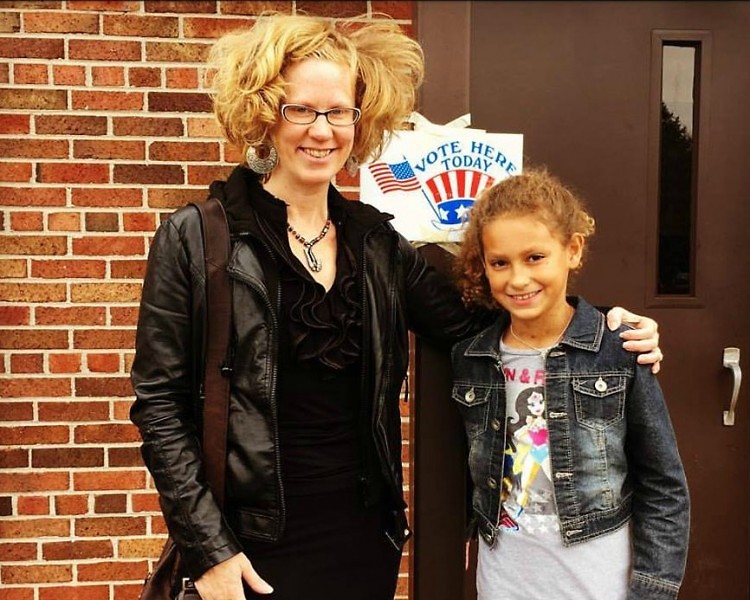Local business owner and force of nature Tami Vandenberg has never been one to be shy about the issues that matter most to her, which are often of a controversial nature. The co-owner of Grand Rapids’ much loved Meanwhile Bar and The Pyramid Scheme, Tami is also the Executive Director of Well House, a nonprofit organization which provides housing to the homeless using a “housing first” model.
Over the years, Tami has fought vehemently for the social and economic parity of Grand Rapids’ most underrepresented citizens. In addition to her own advocacy work, she’s served on numerous boards and task forces focused on drug policy reform, reducing violence, ending homelessness and boosting opportunities for small business.
Most recently, Tami has forayed into politics with her recent run for city commissioner. Her knack for fearlessly fighting for social equality while building bridges with key decision makers has brought her into the spotlight of many of Grand Rapids’ most hotly debated political topics.
In light of her rising political leadership and in honor of Women’s History Month, Tami is being featured in a discussion on “Women in Politics” hosted by Grand Rapids’ Throwbactivists at Billy’s Lounge this Thursday evening. Tami will also be participating on a panel about Women + City Building hosted by DGRI at LINC Up on Tuesday, March 29th.
I sat down with Tami over coffee to talk about what her unique journey into politics has taught her about the relationship between gender and legislature.
Q: Women’s History Month aside, do we need to be having a conversation about women in politics? If so, why?
A: We desperately need to be having the conversation! Last week I posted a link to a free press article, citing the numbers of women in Michigan’s legislature. Women are 20%, which puts us 35th in the country for our percentage of women in state legislature. Colorado was the highest, at 42%. Every state should be at 50%. I believe that across the board, the data shows that women are vastly underrepresented.
Q: How are “women’s issues” different from men’s issues?
A: Well clearly, you have a different lived experience. You may or may not be having babies, or dealing with sexual harassment on a regular basis. You may or may not be paid 70 cents to every dollar that a male earns.
Clearly, your economic situation in general is going to be less than your male counterparts. That’s just data. You look at that 70 cents to the dollar over the lifespan of a woman, and that’s a huge amount of cash we don’t have.
Q: Would you add a disproportionate share of childcare and household duties and expenses to that disparity?
A: Absolutely, and I would add to that, parent caretaking duties. Especially women of my age, moving into our 40s, we’ve got our kids, and we’ve got our parents. We’re taking leave for potentially both those reasons, as well as trying to fight for…not even for the whole pie, not even for trying to make up for lost time, simply trying to come somewhere near gender parity.
It can be exhausting, but think of the women who got us to where we are. We can’t let them down now!
Q: Where do you think that disparity comes from?
A: I think there aren’t enough women running, for one thing. You have to have that supply. A few interesting things I was reading in the same article, which I’ve definitely encountered, is that women have to raise money, so some women are daunted by that. There’s a significant amount of shameless self promotion that’s involved, which many of us have been cultured against - we’ve been cultured to be seen and not heard.
There’s also the ugly side of politics, which I think is one of the biggest barriers for women. When you put yourself in the public realm, and people can say whatever they want about you, and you have to be prepared for that. Not only are people looking at your values, and your platform, but, with the added novelty of being a woman, people talk about your appearance, what you’re wearing. They’re calling you aggressive.
I don’t know how many times I’ve been called aggressive over the last year. Even by other women.
As we’re talking about culture, I think another important thing to address is that for centuries, women have been cultured to compete against each other. We still have that ingrained - that only some of us can succeed - therefore we end up (unnecessarily, I believe) competing with each other. It’s getting better, with time, as we confront that, but it’s still a big issue.
As with any marginalized group, I think you have people who get in, and they get protective. It’s not excusable, but it’s understandable.
That’s one of the many reasons why we need to flood every level of office with women candidates, so that it’s not novel anymore, and we don’t have to worry about protecting what’s ours.
Q: Do you think you’ve been treated differently as a woman, in the political arena? Can you cite an example?
A: Well one theme throughout my younger years was that I was reluctant to speak up. I felt like I had to have an obscene amount of knowledge on a topic in order to contribute. And what I encountered time and time again, was that I would have these side conversations with other people, and then a gentleman would bring up one of my ideas.
So apparently, I actually do know as much as everyone else on the stage - or possibly more in some settings. It became clear that I needed to insert myself and my ideas. I’ve also had the experience where I brought up an idea, and it was not accepted, and a man brought up the same idea later, and it was accepted.
Q: How did you deal with that?
A: I debated a lot. Do I waste my energy getting upset? Do I call it out? Do I let it go? I had this whole internal debate of whether it was worth it or not. Generally, I let things like that go. It’s more about what the idea is.
I’m usually of the mind that it’s less important whose idea it is; what’s important is that the good idea happens. That’s on the social side - if it’s for the betterment of humanity. If it’s in business, then it’s a different story. Your idea is your livelihood, which is different. If it’s for the public good though, I usually let it slide.
Don’t get me wrong - there’s definitely a time to call people out, but I try to be really strategic about that. You’ve got to pick your battles.
I’ve simply started to repeat myself more. I find myself repeating the same thing, sometimes five times. Being persistent. Sometimes you have to speak louder and speak more often to be heard. And sometimes you will end up annoying people.
Q: Are you devastated when you find out that you’ve annoyed someone?
A: I used to feel that way. Now I just chalk it up to interacting with someone who isn’t educated on the issues, or gender equality, and maybe there’s something I can do to help at some point.
Q: Let’s talk about local politics. Do you know what women’s representation is at our local city level?
A: In terms of the city commission, we’re actually doing better than we ever have. We have our first female mayor in the history of Grand Rapids, which is fantastic, and we also have two other female commissioners. They are still majority male, but three is the most I think we’ve ever had.
In terms of county, I’d have to look it up, but it’s definitely a small minority. On city boards, I know organizations are working very hard to get more women. And more minorities.
I do want to add that I fully recognize that as a white, straight female, that a lot of this is easier for me than it would be for a woman of color, or an LGBT woman who’s facing layers of struggle. So while I understand my struggle, it’s important to acknowledge that other women have an even greater hill to climb.
Q: Last question. Respond to this statement: “now that Grand Rapids has its first female mayor, sexism in Grand Rapids is over, right?”
A: *laughs* I am an analytical person. I love data, I love research. So whenever I’m learning about a problem, or investigating whether a problem exists, I want to see the data. Specifically, the economic data. What are people being paid? I want to look at city stats - that’s another big issue. Look at the percentage of city staff who are white men. It’s an overwhelming majority.
You need to look at the data. I try to not comment on issues unless I know the representation, the economic situation - who has the actual power? Those are the questions I think we should be asking.
The Rapidian, a program of the 501(c)3 nonprofit Community Media Center, relies on the community’s support to help cover the cost of training reporters and publishing content.
We need your help.
If each of our readers and content creators who values this community platform help support its creation and maintenance, The Rapidian can continue to educate and facilitate a conversation around issues for years to come.
Please support The Rapidian and make a contribution today.

